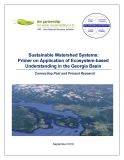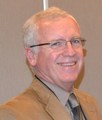EVENT OF RECORD: "Sustainable Watershed Systems: Primer on Application of Ecosystem-based Understanding in the Georgia Basin" – released at AGM, Mid Vancouver Island Habitat Enhancement Society (Sept 2016)
Note to Reader:
Over the past two decades, a series of teachable moments caused by droughts, forest fires and floods has set the stage for local governments in BC to implement a “whole systems” approach to community planning and infrastructure servicing.
Also known as “designing with nature”, this approach has the potential to re-set the ecological baseline along the east coast of Vancouver Island and in the Lower Mainland.
On September 21, 2016 the Partnership for Water Sustainability in British Columbia released Sustainable Watershed Systems: Primer on Application of Ecosystem-based Understanding in the Georgia Basin. This is the 6th in the Beyond the Guidebook Primer Series.
The venue for release of this guidance document was the Annual General Meeting of the Mid Vancouver Island Habitat Enhancement Society (MVIHES), held in Errington in the Regional District of Nanaimo.
Think and Act Like a Watershed: Primer on Application of Ecosystem-based Understanding Connects Past and Current Research
Local governments are starting to recognize that natural assets have value, ecosystem services have a role in municipal service delivery, and so need to be integrated into their asset management programs.
 For these reasons, Sustainable Watershed Systems: Primer on Application of Ecosystem-based Understanding in the Georgia Basin is written in a magazine-style to help multiple audiences – whether elected, administrative, technical or stewardship – ask the right questions and ensure that “science-based understanding” is applied properly and effectively to implement land development practices that restore the water balance (hydrologic integrity) of watersheds.
For these reasons, Sustainable Watershed Systems: Primer on Application of Ecosystem-based Understanding in the Georgia Basin is written in a magazine-style to help multiple audiences – whether elected, administrative, technical or stewardship – ask the right questions and ensure that “science-based understanding” is applied properly and effectively to implement land development practices that restore the water balance (hydrologic integrity) of watersheds.
To Learn More:

Sustainable Watershed Systems,
through Asset Management
The Primer serves as a refresher on core concepts that underpin the vision for Sustainable Watershed Systems, through Asset Management.
Watershed systems are infrastructure assets. They need to be managed and protected as such.
The Partnership objective in publishing this Primer is that readers will grasp WHY it is necessary to “stay true to the science” IF communities are to achieve a vision for Sustainable Watershed Systems.
Whole Systems Approach
“Sustainable Watershed Systems is the outcome that would result from a ‘whole systems’ approach to community development and infrastructure servicing,” states Peter Law.
 He is both a Partnership Director and a MVIHES Director.
He is both a Partnership Director and a MVIHES Director.
“Implementation of ‘whole systems’ thinking would include incorporating the benefits provided by nature into the delivery of local government services.”
“Stream health and what happens on the land are connected.”
“In the early 1990’s, the ‘Coho Salmon crisis’ raised the alarm that changes in hydrology caused by land development were resulting in small stream salmon demise.”
“The stewardship sector was the catalyst for restorative action in BC.”
“Community-based Environmental Stewardship has been an institution in BC for a generation.”
“From the early days of Fish & Game Clubs in the 1950’s, the role of the stewardship sector has evolved.”
“Today, community organizations partner with local governments to monitor and restore local watershed health. These groups provide thousands of volunteer hours to restore aquatic habitats.”

Coho salmon spend half their lives in freshwater. This makes them sentinels whose health speaks well for the food web, the quality of its streams, and the rainwater runoff that does or does not flow into them.


